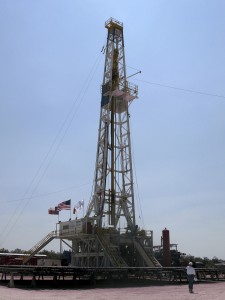Shades of Texas Law Seen in Proposed Federal Fracking Guidlines

REUTERS /Anna Driver/LANDOV
While it's called the Railroad Commission of Texas, it actually deals with regulating oil and gas in the state. And a name change isn't likely to happen this session.
As Americans watch the U.S. Bureau of Land Management develop rules to manage fracking on federal land, the Texans among them would be forgiven for wondering “what does have to do with us?” After all, due to the state’s unique history, there are virtually no federal lands in Texas.
Well, the rules may have more to do with Texas than you may think. Particularly in their reliance on the online database FracFocus.org to disclose what chemicals drillers are pumping into the ground.
As we reported last month, FracFocus was criticized in a report from Harvard Law School’s Environmental Law Program. It found that the database doesn’t do a good job of disclosing information and can make it more difficult for companies to comply with state regulations. Twelve states, including Texas, require drillers to use FracFocus to disclose their drilling chemical mixes.
The Harvard report, which was quickly dismissed by many state regulators including the Railroad Commission of Texas, also echoed previous findings that FracFocus allows too many companies to hide their chemical ingredients under the guise of trade secrets. This is especially a concern for people worried about the potential for groundwater pollution associated with fracking.
Part of the aim of the Harvard report was to encourage the Bureau of Land Management to seek out a more comprehensive and user-friendly system for companies to disclose what chemicals they use.
From the looks of it that goal has failed, at least for now.
Last week the Bureau of Land Management, released a new version of draft rules for fracking on public land that appears to embrace FracFocus as the best option for chemical disclosure.
The proposed rules mention FracFocus a total of 48 times. In them the Bureau concedes that about half of people who submitted comments on the rules discouraged it from using the registry. Ultimately, the Bureau decided to incorporate the registry into its rules because it believes that working “to improve FracFocus will be more cost-effective and beneficial than creating a separate database for Federal and Indian wells.”
This plan to revamp the database form the inside does not comfort Kate Konschnik, the Policy Director for the Environmental Law and Policy Program at Harvard, and lead author of the critical report.
In an email to StateImpact Texas Konschnik points out that the Bureau’s options are “not limited to working behind the scenes with a private third party to improve reporting, or building a new reporting system from whole cloth.”Kronschnik suggests that the BLM “might write minimum requirements for FracFocus into the rule, or include language in the post-fracking certification that requires companies to aver they have submitted true, accurate, and complete information on its FracFocus form, under penalty of perjury.”
As things stand now, she says, the Bureau is requesting less information than many states. The current proposed rules, “allow a third party private registry to set the federal floor for chemicals disclosure,” she writes.
There is, however, at least one area where the Bureau’s proposed rules go beyond what is required in some states that use FracFocus. And in that area the BLM draft closely mirrors Texas disclosure laws.
The draft suggests that drillers should submit their chemical use to FracFocus or another BLM database.
“This implies that the BLM may be following the system that Texas established, where companies report to the BLM if the FracFocus site were to close,” Konschnik writes.
That observation is backed up by the section of the draft rule that says if drillers are “unable to submit the information about the chemicals through FracFocus or another BLM-designated database, the operator must timely submit the required information directly to the BLM.”
One of the concerns over states’ reliance on FracFocus is that it is a private website that could, theoretically, shut down at any time.
The sections of the draft that refer to another “BLM-approved” website, open up another possibility: that a different third-party fracking registry could come along and attempt to displace FracFocus as the preferred database for fracking disclosure, at least on federal lands.
